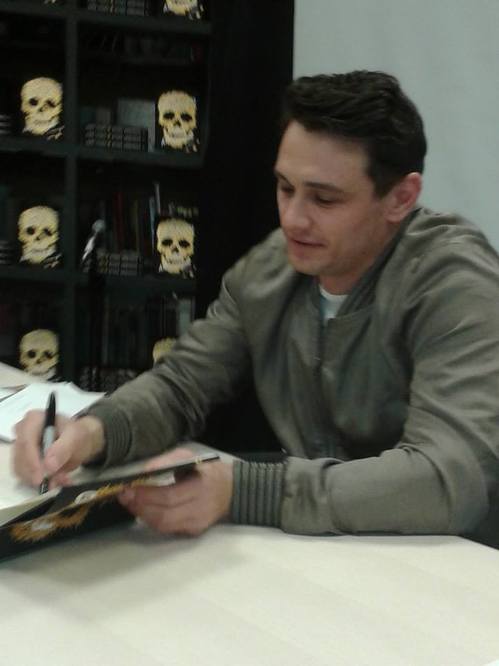When I first heard about the James Franco event in Montreal I was excited to learn more about his book, Actors Anonymous, but was soon disappointed to find out that it would be a signing event without a reading or question period. Though initially discouraged, I began to think about what the event might be like. What kind of people would wait in line just to get a signature? Would the people attending be interested in Franco as an author or as an actor in films like This is the End and Pineapple Express? What kind of relationship with these fans have with the work? What value does the signature have both in terms of emotional significance and monetary value?
The event, which I initially thought would be quite popular, gathered momentum within the first few days of being announced. Twitter, Facebook, and local blogs all spread the news of Franco's visit. I was surprised, however, to see that most of the content did not talk about James Franco, did not talk about his career, and did not even mention his book or the fact that this was his second book. Instead, the event became about Montreal and about how Montreal was going to host this celebrity.
Despite all of my questions, I decided to attend. According to the bookstore's website, the wristbands needed to meet Franco would be distributed at nine o'clock in the morning, but I knew I had to get there early. I found a place in line at six o'clock and was surprised to hear most fans talking about their individual experiences of meeting Franco rather than their relationship with his work or career. It was all about trying to get James Franco to take a picture with you, taking a picture of the outfit you wore to meet James Franco, or as one girl said having enough time to be able to convince James Franco "to marry you."
After getting my wristband and getting the copies of the book he was signing, I started to read the book's content which explores fame, acting, and the movie business. It was here that I began to fully appreciate the contrast between the words in the book, and the signature Franco would be scribbling on the books bought by the lucky first 500 fans. Actors Anonymous, once I read even more, seemed to be exactly the kind of book that should not be mass distributed. From its first section, Franco's narrator says, "I'm like a sophisticated prop. I'll give you all the feeling you want, all the accent you want, all the hairstyles and wardrobe changes you want, and I'll say whatever you put in front of me. But don't ask me to take pride in the work." Though he was speaking of his acting career, I had a hard time believing most of the people in line were there due to his success in the book industry. Instead, it seemed to be about being close enough to him to see him as one of the characters he plays, to see him as the lovable stoner from Pineapple Express or the dashing hero of Tristan and Isolde. After getting close enough to him, I wondered how many of these fans would actually read the book.
Much later that day I got to the actual event, I saw a stark contrast to the crowd falling asleep on the floor in their sweatpants. Instead of comfortable clothes, everyone looked like they had made an effort to look dressed up, fashionable, or desirable. The energy level had picked up quite a bit considering everyone began trying to push towards the signing area where Franco would later sit. Many of the workers in the bookstore looked stressed or confused about how to manage so many excited fans, but the bookstore benefited through the numerous cameras flashing pictures of Franco with their logo right behind, not to mention selling hundreds of books earlier in the day.
When James Franco finally arrived, I could barely hear the few sentences he spoke over the screams of those trying to push their way towards him. The line up for a signature moved quickly and the closer I got, the more flashes I saw. I heard people calling out his name, saw staff members trying to hold back the crowd, and saw the author of Actors Anonymous looking up between signings. Fans begging him to look their way, called out to him to smile, and wanted to engage him in any way possible. As Franco puts it in his book, "if you're an actor in a film, people will think that you are like your roles." Everyone wanted a glimpse of the actor they were used to seeing, wanted him to pay attention to them, and to feel like they waited all day to get a moment in which they felt like they met someone famous who interacted with them in a personal way.

Leave a comment